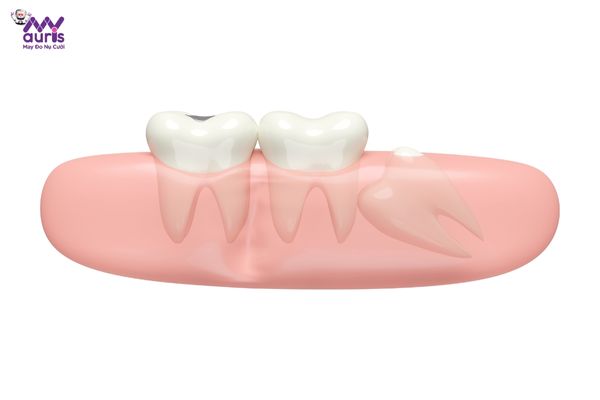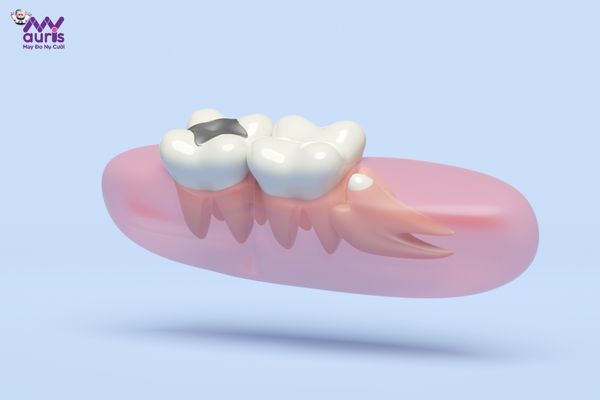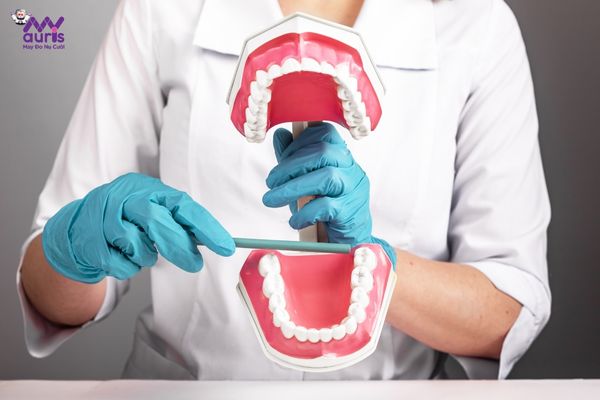Everyone who talks about wisdom teeth is haunted and afraid of pain and discomfort. Therefore, most people are interested in when wisdom teeth grow in order to properly prepare and care for their teeth. To know when wisdom teeth grow and at what age, let’s find out with My Auris through the following article.
Learn about wisdom teeth
Wisdom teeth are also known as tooth number 8 – this is one of the last teeth on the jaw. Because they grow last, the jaw has no more room for teeth to grow, so wisdom teeth often tend to grow crookedly, obliquely or underground.
Tooth number 8 causes a lot of trouble when it grows and has almost no important role in the jaw. Therefore, not having wisdom teeth will not affect chewing or aesthetics.
Each person usually has a maximum of 32 teeth including 28 teeth (14 upper molars and 14 lower molars) and 4 wisdom teeth growing in the 4 inner corners of both the upper and lower jaw. However, not everyone grows all 4 wisdom teeth, some people only grow 1 or 2 in the lower jaw, not the upper jaw.

When wisdom teeth grow, recognizable symptoms will appear. Therefore, as soon as you have the first signs, you should see a doctor early to get appropriate pain relief or treatment.
When do wisdom teeth grow?
When do wisdom teeth grow is of interest to many people. Because everyone is afraid of wisdom teeth growing up, causing pain, affecting chewing and oral health.
Wisdom teeth usually grow when people reach adulthood, whether male or female. The average age of wisdom teeth eruption is 17-25 years old and the timing of wisdom teeth eruption is different for each person depending on their constitution. Besides, people think that wisdom teeth stop growing at age 25, but there are also a few cases of wisdom teeth growing at 30-40 years old.
When wisdom teeth “start” to grow, the most obvious sign is raging pain. This condition can be more or less depending on the body, the direction of tooth growth, tooth size and jaw bone structure. According to research, the older you are, the more painful it will be for wisdom teeth to grow.
Wisdom teeth do not grow completely at one time but are divided into many stages and times. The times when teeth emerge can be 1-2 months or longer apart. And every time it grows, there will be pain, so the process of growing wisdom teeth dPersistent pain causes prolonged pain.

In some cases of impacted or crooked teeth, the gums cannot emerge from the gums, which can also make the pain more severe and prolonged. Some people only have pain for 1-2 days and then it goes away, but some people will have pain that lasts 7-10 days or longer.
A wisdom tooth may take about 1-2 years, even 3 or 5 years to complete. Therefore, depending on the age when your wisdom teeth appear, you should prepare yourself mentally as well as apply appropriate remedies.
Signs that wisdom teeth are growing
When teeth grow, there will be some clear signs that you need to pay attention to for effective pain relief. result:
- Pain in the back of the jaw comes in waves: first, the pain will appear around the gums right where the wisdom teeth emerge. Wisdom teeth grow intermittently and for a long time, so the pain will come in waves. In particular, misaligned wisdom teeth will be more painful than straight wisdom teeth.
- Swollen gums: wisdom teeth are large, so when they grow, the gums will stretch and bulge. At this point, you will easily notice the swelling with the naked eye. Swollen gums are accompanied by pain and food entanglement, which can cause the cheeks to swell. This condition only ends when the wisdom teeth have grown stably.
- Slight fever, body temperature increases higher than normal: when wisdom teeth grow, symptoms of mild fever often appear and make the body tired. However, this is not something to worry about because the fever is not too high and will stop when the wisdom teeth fully grow.
- The jaw muscles become stiff, less flexible, difficult to move, and it is also difficult to open the mouth to eat and chew normally.

Should wisdom teeth be extracted or kept?
The existence of wisdom teeth greatly affects oral health and hinders eating.g normal. Removing wisdom teeth early will bring many benefits to oral health. However, tooth extraction is not necessary in all cases, it depends on the condition of the teeth.
So, when wisdom teeth grow and want to be removed, see a doctor for advice and appropriate treatment.
Instances where wisdom teeth should be extracted
The best time to have wisdom teeth extracted is from 18-28 years old when the teeth have grown ⅔. As you get older, the jawbone becomes stronger and denser, so wisdom tooth extraction becomes more complicated and the wound heals longer.
Wisdom teeth that are impacted, impacted, impacted, or growing horizontally must be removed to prevent dangerous complications for oral health. In addition, if wisdom teeth grow and encounter the following conditions, they should also be removed:
- Growing wisdom teeth cause pain, inflammation, covered gums, and persistent infections that affect surrounding teeth.
- There is a gap between the wisdom tooth and the adjacent tooth number 7, so food can easily get trapped, causing bacteria to attack and damage the tooth.
- Wisdom teeth grow straight but have tooth decay, pulpitis, periodontitis or do not have opposing teeth that fit properly, leading to elongated growth, causing damage to the opposite gum area.
- Wisdom teeth that are deformed, too big or too small can easily clog with food, leading to tooth decay and bad breath.

Instances where wisdom teeth should not be extracted
In cases where wisdom teeth grow normally, align with the opposite teeth, do not create a gap with neighboring teeth, do not cause pain, and are not pathological, extraction is not required. However, in this situation, everyone should pay attention to good oral hygiene because the wisdom teeth are located deep in the jaw.
For people with straight wisdom teeth but with health problems such as diabetes, cardiovascular disease, hemophilia, etc., wisdom tooth extraction should not be performed. In these cases, they can only be removed when they are too uncomfortable, painful, or have a medical condition, but the medical condition must be carefully examined.
In addition, pregnant women, menstruating women, people who have just recovered from illness or are havingOral infections also contraindicate temporary wisdom tooth extraction. These conditions must wait until after giving birth, ending menstruation and completely treating the infection before wisdom teeth can be extracted.

Hopefully the information in the article about when do wisdom teeth grow helps people understand the stage and prepare mentally firmly. If there are unusual signs, pain or discomfort, you should go to the dentist/hospital for examination as soon as possible. Please contact My Auris Dental immediately for advice and to schedule an examination as soon as possible.
Anh Thy





